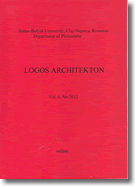The principle of inseparability
The principle of inseparability
Author(s): Ionel NarițaSubject(s): Philosophy
Published by: Presa Universitara Clujeana
Keywords: knowledge; perceptions; authority; tolerance; inseparability
Summary/Abstract: The approached issue of this paper is how does a cognitive agent get knowledge about the real world starting from his own perceptions? The answer to this problem depends on the epistemic principle which we are agreed to. There can be two epistemic principles: the principle of authority and the principle of tolerance. According to the principle of authority, only some cognitive agents are justified to derive objective truths from their perceptions. The tolerance principle has the consequence that there is no absolute objective truth but only a relative truth. With other words, there is no ground to separate the cognitive agent from his perceptions or, according to the principle of inseparability, if something cannot be separately thought, it also cannot be separated in reality.
Journal: Logos Architekton. Journal of Logic and Philosophy of Science
- Issue Year: 6/2012
- Issue No: 01
- Page Range: 27-38
- Page Count: 12
- Language: English

